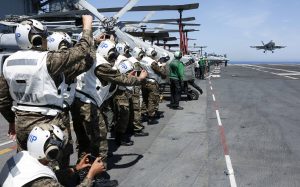In his first trip to Africa as U.S. secretary of defense, Mark Esper noted that “China and Russia continue to intimidate and coerce their neighbors while expanding their authoritarian influence worldwide, including on this continent.” He was speaking at the North Africa American Cemetery in Carthage, Tunisia on September 30, the first day of his tour of three North African nations. “The United States’ enduring partnership with like-minded countries — including here in North Africa — is key to addressing these challenges,” Esper said.
During his Tunisia visit, the U.S. defense secretary also signed a 10-year military cooperation agreement with the country Washington designated a “major non-NATO ally” in 2015. The two countries remain worried about neighboring Libya, which has increasingly become a Russian stronghold through the civil war there. In fact, Libya and Russia seem to be the framing concerns behind Esper’s northern Africa trip. U.S. Defense Department officials have noted that “Russia is trying to establish a military base in Libya. If it succeeds, any solution to the war in Libya will be harder to negotiate.”
Esper will visit Algeria today before heading to Morocco. He becomes the first American defense secretary to arrive in Tunis after Donald Rumsfeld’s 2006 visit. Algeria remains a key partner of Russia. Reuters notes that ahead of Esper’s visit, the country’s army chief met with a Russian military delegation. The country accounted for half of Russia’s arms sales in the African continent in 2018, according to the Russian ambassador in Algiers. Algeria and China also signed a memorandum of agreement around the Belt and Road Initiative (BRI) in 2018. According to speculations, China also supplied Algeria with sophisticated third generation HJ-12 anti-tank missile systems in March this year, the first country to receive so.
Morocco and Algeria both have privileged diplomatic relations with China, as Strategic Partner and Comprehensive Strategic Partner, respectively.
A 2019 Brookings report observes that “China is setting up North Africa to play an integral role in connecting Asia, Africa, and Europe — a key aim of President Xi Jinping’s [BRI],” going on to demonstrate the multi-dimensional Chinese engagement – spanning economic, political and military cooperation – with the region. It notes that high-level political visits of Chinese and North African leaders have grown between the past five and ten years. A CSIS China Power study finds that “Northern African countries are the primary destination of Chinese weapons, constituting 49 percent of Chinese exports to the continent.”
Between the Russian thrust in Libya and the Chinese push across Africa’s north, the U.S. military would like to continue to be keenly interested in the region, even at a time when suggestions abound that the Pentagon may seek to reduce its African footprint as a whole. Reports surfaced in December last year that Esper was contemplating a significant drawdown of U.S. forces from West Africa stationed there in various counterterrorism functions, as part of a larger reorientation towards “great power competition” with China and Russia. An internal Pentagon review of the U.S. Africa Command – which would have recommended the appropriate force level for the region — was to be completed by September.
In January this year, speaking at a New Delhi event, U.S. Deputy National Security Advisor Matt Pottinger expanded the American definition of the Indo-Pacific – which until then had meant the area of responsibility of the Indo-Pacific Command – to stretch to the eastern seaboard of Africa from the U.S. western coast. It remains unclear precisely what this means in terms of theater-command responsibilities and their roles.

































